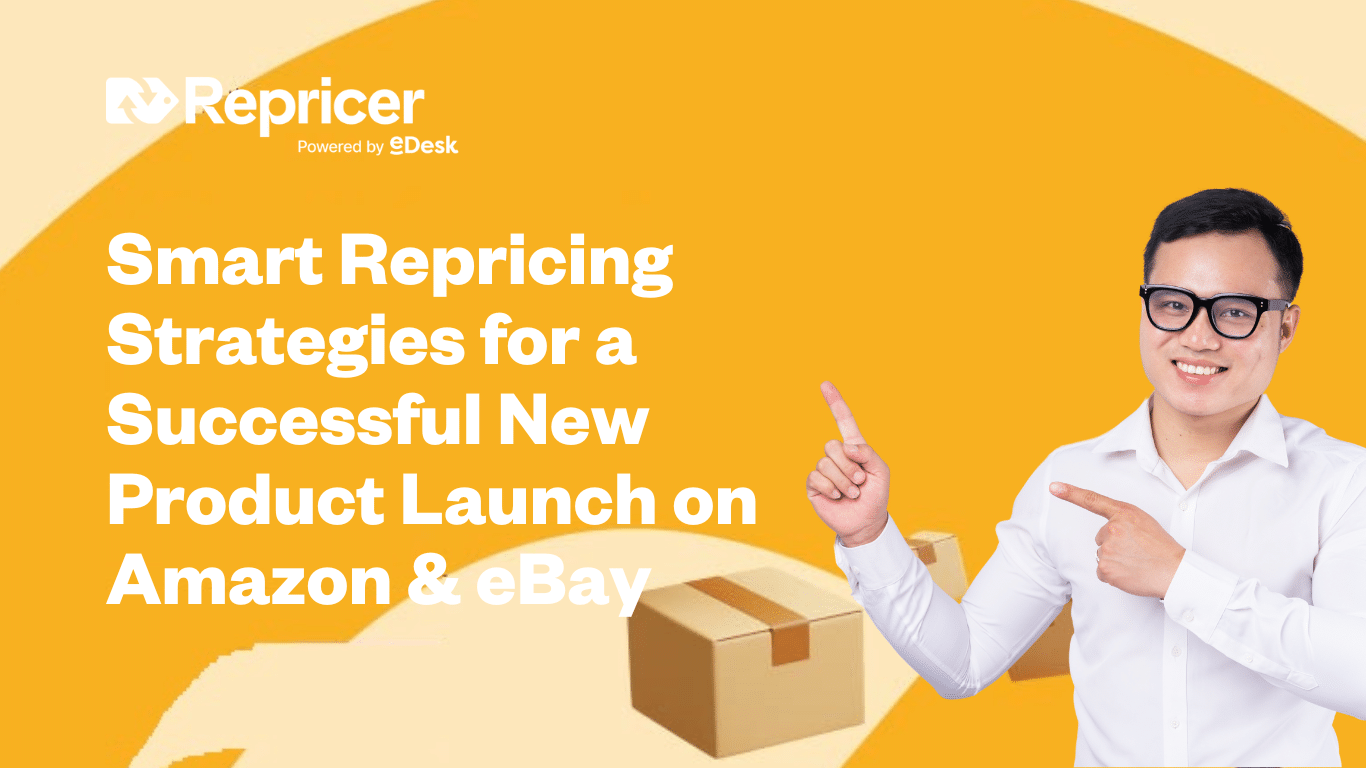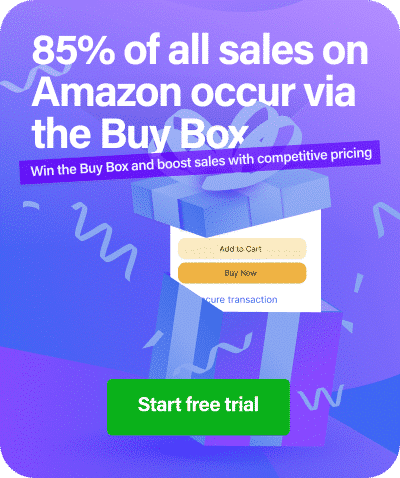Launching a new product on marketplaces like Amazon and eBay is both exciting and challenging. Without sales history or established competitor data, setting the right price can feel like shooting in the dark. However, with the right repricing strategies and new product launch approach, you can navigate this crucial phase and set your product up for long-term success.
The Challenge of Pricing New Products
When you’re launching something completely new, you’re working with limited information. Unlike established products with months of sales data and clear competitor benchmarks, new items require a different approach. Recent data shows that <a href=”https://www.businessdasher.com/product-launch-statistics/” target=”_blank”>over 30,000 new consumer products are launched annually</a>, yet only 40% of developed products successfully reach the market. Of those that do make it, only 60% generate meaningful revenue.
This reality makes your Amazon new product pricing strategy absolutely critical. The first few weeks after launch can determine whether your product gains traction or gets lost in the vast marketplace.
Understanding Product Launch Velocity
Product launch velocity refers to how quickly your new item gains momentum in the marketplace. This includes factors like initial sales volume, ranking improvements, and customer engagement. For new products, velocity is everything because it directly impacts your visibility and Buy Box eligibility new products.
Amazon’s algorithm favors products that show strong early performance. According to recent marketplace data, over 56% of consumers start their product searches on Amazon, making initial ranking crucial for long-term success.
Penetration vs. Skimming: Choosing Your Launch Strategy
When developing launch pricing tactics, you’ll need to choose between two primary approaches:
Penetration Pricing Strategy
This approach involves launching at a lower price point to quickly gain market share and initial sales rank. The benefits include:
- Faster customer acquisition
- Improved organic ranking through increased sales velocity
- Earlier Buy Box wins against established competitors
- Valuable early customer reviews and feedback
Price Skimming Strategy
This method starts with higher prices, then gradually reduces them over time. This works well when:
- Your product offers unique features or superior quality
- Competition is limited in your niche
- You want to maximize early profit margins
- Your target market is less price-sensitive
Most successful new product launches benefit from a modified penetration approach, especially on competitive marketplaces.
Setting Up Effective Repricer Rules for New Products
A smart Repricer becomes invaluable during the launch phase because it can automatically adjust your pricing based on real-time market conditions. Here’s how to configure your repricing rules for new products:
Initial Launch Phase (Days 1-14)
Rule 1: Aggressive Penetration
- Set your price 5-10% below the lowest competitor
- Monitor Buy Box eligibility for new products closely
- Adjust every 2-4 hours for maximum responsiveness
Rule 2: Velocity Monitoring
- Track sales per day and adjust pricing based on performance
- If sales are below target, increase aggressiveness
- If inventory moves too quickly, gradually raise prices
Establishment Phase (Days 15-45)
Rule 3: Competitive Positioning
- Move to competitor-matched pricing or slight premiums
- Focus on maintaining consistent Buy Box wins
- Begin testing price increases based on conversion data
Rule 4: Profit Optimization
- Gradually increase margins while monitoring sales velocity
- Use competitor benchmarking of new items to inform adjustments
- Maintain pricing flexibility for seasonal fluctuations
Mastering eBay New Item Pricing
eBay’s marketplace dynamics differ significantly from Amazon’s. With 134 million active buyers browsing 2.3 billion active listings, visibility strategies need adjustment.
eBay-Specific Pricing Considerations
Auction vs. Buy It Now Recent statistics show that 88% of eBay sales come through “Buy It Now” rather than auctions. For new products, fixed-price listings typically perform better because they:
- Provide immediate purchase options
- Allow consistent pricing strategies
- Enable better inventory management
- Support automated repricing tools
Best Offer Strategy Enable “Best Offer” on your listings to:
- Gauge true market demand
- Collect pricing intelligence
- Maintain flexibility during the launch phase
- Increase conversion rates
Monitoring Buy Box Eligibility for New Products
Amazon’s Buy Box is crucial for new product success. For new items, winning the Buy Box requires careful attention to several factors:
Key Buy Box Factors for New Products
Pricing Competitiveness
- Stay within 5-15% of the lowest offer
- Monitor competitor changes hourly during launch
- Use dynamic pricing to respond to market shifts
Fulfillment Method
- FBA products have significant advantages
- FBA adoption reached 82% in 2024 for good reason
- Ensure fast, reliable shipping for FBM products
Seller Performance Metrics
- Maintain excellent order defect rates
- Respond quickly to customer inquiries
- Process orders immediately
Inventory Levels
- Keep adequate stock to avoid stockouts
- Monitor velocity to prevent overselling
- Use inventory forecasting tools
Price Testing New SKUs: A Systematic Approach
Testing different price points is essential for optimizing your new product’s performance. Here’s a structured approach:
Week 1-2: Baseline Testing
- Start with penetration pricing
- Monitor conversion rates and traffic
- Track ranking improvements
- Note competitor responses
Week 3-4: Incremental Testing
- Increase prices by 5-10%
- Monitor impact on sales velocity
- Adjust based on conversion data
- Test different price points for different customer segments
Week 5+: Optimization Phase
- Implement dynamic pricing based on demand
- Use seasonal adjustments
- Monitor long-term profitability
- Refine pricing strategy based on data
Advanced Repricing Strategies for New Products
Time-Based Pricing
Implement different pricing strategies based on time of day, week, or season:
- Higher prices during peak shopping hours
- Competitive pricing during high-traffic periods
- Adjusted pricing for holiday seasons
Inventory-Based Adjustments
Link your pricing to inventory levels:
- Increase prices when stock is low
- Use penetration pricing when overstocked
- Implement automatic adjustments based on turnover rates
Competitor Response Strategies
Monitor and respond to competitor pricing changes:
- Set maximum and minimum price boundaries
- Implement rapid response rules for price wars
- Use Insights tools to track market trends
Common Pitfalls to Avoid
Pricing Too Low Initially
While penetration pricing works, going too low can:
- Damage perceived value
- Create unsustainable customer expectations
- Hurt long-term profitability
Ignoring Total Cost of Ownership
Factor in all costs when setting prices:
- Marketplace fees
- Fulfillment costs
- Advertising expenses
- Return processing
Lacking Flexibility
New product markets change rapidly:
- Use automated repricing tools
- Monitor competitor launches
- Adjust strategies based on performance data
Measuring Success and Making Adjustments
Key Performance Indicators
Track these metrics during your launch:
- Sales velocity (units per day)
- Conversion rate improvements
- Organic ranking progress
- Buy Box win percentage
- Customer acquisition cost
When to Pivot Your Strategy
Consider strategy changes when:
- Sales velocity remains consistently low after 2 weeks
- Competitors consistently undercut your pricing
- Inventory turnover is too slow or too fast
- Customer feedback suggests pricing issues
Leveraging Technology for Success
Modern Repricing Strategies rely heavily on technology. The right tools can:
- Monitor competitor prices 24/7
- Automatically adjust pricing based on predefined rules
- Provide detailed analytics and insights
- Alert you to significant market changes
- Integrate with inventory management systems
Building Long-Term Success
Remember that your new product launch is just the beginning. Successful repricing strategies for new product launch efforts should evolve into sustainable long-term pricing approaches. As your product gains traction and you gather more data, you can:
- Refine your pricing models based on actual performance
- Develop seasonal pricing strategies
- Create customer segment-specific pricing
- Build brand equity that supports premium pricing
The Role of Reviews and Social Proof
Pricing affects your ability to generate early reviews. Consider:
- Lower initial prices to encourage trial purchases
- Following up with customers for feedback
- Using early positive reviews to justify price increases
- Monitoring review sentiment when adjusting prices
Conclusion
Successfully launching a new product on Amazon and eBay requires a strategic approach to pricing that balances visibility, velocity, and profitability. By implementing smart repricing strategies, monitoring Buy Box eligibility, and remaining flexible in your approach, you can navigate the challenging early days and build a foundation for long-term success.
The key is to start with a clear strategy, use the right tools to automate and optimize your pricing, and remain responsive to market conditions. With thoughtful planning and execution, your new product can quickly gain traction and achieve sustainable profitability in today’s competitive marketplace.
Remember to regularly review your Amazon Buy Box Guide strategies and adjust your approach based on performance data. The most successful sellers view pricing as an ongoing optimization process rather than a one-time decision.





